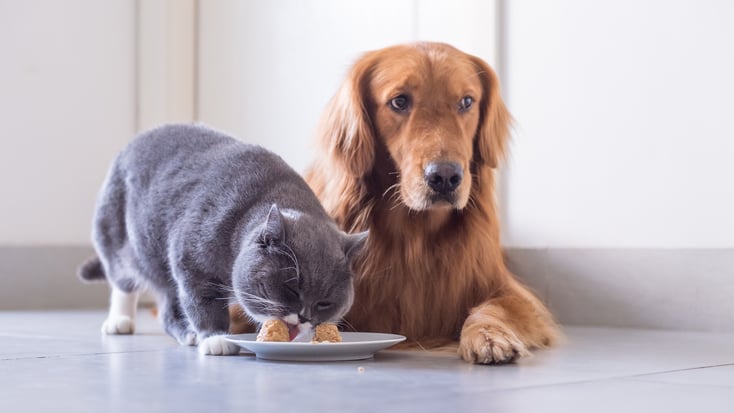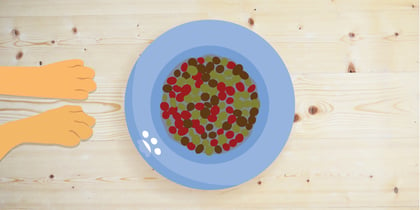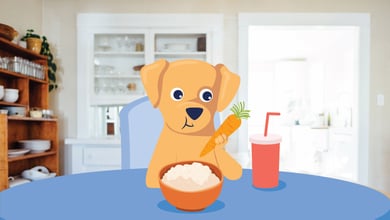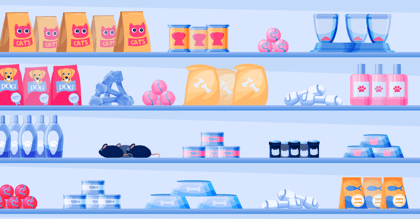Can Cats Eat Dog Food? A Vet Weighs In

Table of Contents
Cats are curious creatures, and if you have a household with cats and dogs, your feline friend may take an interest in the contents of your dog's bowl. You may wonder whether it's okay for a cat to eat dog food or even whether you can save time and effort and feed your cat dog food daily.
The good news is that dog food isn't toxic to cats but can cause health problems if your cat eats it regularly. In this article, we will provide a comprehensive answer to the question, "Can cats eat dog food?" including why it's not okay for your cat to eat dog food and what you must do if your cat sneaks a nibble of your dog's dinner.
Key Takeaways:
- Dog food is not toxic to cats but can cause health problems if consumed regularly.
- Cats require a complete and balanced diet with high-quality proteins, fats, and vitamins tailored to their life stage.
- Tailored professional advice on pet nutrition and feeding guidelines can be obtained from a professional veterinarian.
Can a Cat Eat Dog Food?
A few bites of dog food occasionally will not harm your cat. However, a cat eating dog food regularly can develop health complications.
Cats are notoriously picky eaters, and dog food is usually unappealing to them. However, that won't stop a cat from eating dog food if it smells of meat or related flavors. The habit of cats eating dog food shouldn't be encouraged.
Potential Risks of Cats Eating Dog Food
What happens if your cat eats dog food? Cats need protein, animal fats, and other nutrients, such as taurine, which is often inadequate in dog foods. Cat food and dog food are balanced to satisfy each species' nutritional needs and to optimize pet health.
Dog food is high in carbohydrates, which means consumption of a dog food diet can predispose your cat to obesity and diabetes in the long term. Dog food also lacks specific nutrients that cats require.
Should My Pet Be Seen by a Veterinarian?
1. Have you noticed changes in your pet’s appetite?
2. Does your pet have diarrhea or loose stools?
3. Have you noticed changes in your pet’s thirst/water consumption?
4. Is your pet having accidents in the house?
5. Is your pet pacing and unable to settle?
6. Is your pet panting more than usual?
7. Is your pet whining or vocalizing more than usual?
8. Is your pet shaking more than usual?
9. Is your pet hiding or avoiding physical contact more than usual?
10. Is your pet more lethargic and sleeping more than usual?
11. Are you concerned about changes in your pet’s behavior?
12. Is your pet scratching their ears?
13. Is your pet licking their paws more than usual?
14. Does your pet have a rash?
15. Is your pet moving more slowly than usual or having a harder time getting up or down?
View Results
Should My Pet Be Seen by a Veterinarian?
1. Have you noticed changes in your pet’s appetite?
2. Does your pet have diarrhea or loose stools?
3. Have you noticed changes in your pet’s thirst/water consumption?
4. Is your pet having accidents in the house?
5. Is your pet pacing and unable to settle?
6. Is your pet panting more than usual?
7. Is your pet whining or vocalizing more than usual?
8. Is your pet shaking more than usual?
9. Is your pet hiding or avoiding physical contact more than usual?
10. Is your pet more lethargic and sleeping more than usual?
11. Are you concerned about changes in your pet’s behavior?
12. Is your pet scratching their ears?
13. Is your pet licking their paws more than usual?
14. Does your pet have a rash?
15. Is your pet moving more slowly than usual or having a harder time getting up or down?
Share Quiz
Nutritional Differences Between Cats and Dogs
Cats and dogs make friendly companions for each other. However, although they have similar needs for play, grooming and can get along well with each other, they have very different nutritional requirements.
Cats are obligate carnivores that require animal-based proteins, while dogs are omnivores that can thrive on various diets with carbohydrates as the main components. The bulk of carbohydrates in dog foods makes them sweeter than cat food. Due to their lack of a sweet taste receptor, cats are disinterested in dog food unless it contains the proteins they need.
Cats also need essential nutrients, such as arachidonic acid, preformed vitamin A, and taurine, that aren't supplemented in dog food to satisfy their requirements sufficiently. These are all nutrients that cats cannot synthesize, but dogs can. Taurinein particular, is necessary for a healthy heart, while the others are involved in various organ functions.
This means that if cats eat dog food, they are on an imbalanced diet, which can result in vision issues, as well as digestive and/or liver problems.
Cat-Specific Nutritional Needs
Although cats require animal-based proteins, feeding these exclusively can cause them to be deficient in other nutrients essential for their health. It is better to feed your cat specially formulated pet food rather than scraps of your own meals.
A complete and balanced diet means incorporating all the nutritional components in their correct ratios. You should feed your cat with high-quality proteins, fats, and vitamins appropriate for its life stage.
A cat's nutritional needs vary across life stages; gestation/lactation, growth, and maintenance. You should read the ingredients in commercial cat foods and ensure the manufacturer follows the guidelines established by the Food and Drug Administration (FDA) and the Association of American Feed Control Officials (AAFCO). It is always best to feed a vet-approved formulation.
According to AAFCO, adult cat food should contain a minimum of 26% crude protein measured on a dry matter basis.
So, can cats eat dog food and still fulfill their nutritional requirements? The short answer is no. Only a cat-specific diet can meet a cat's special nutritional needs, so you should never feed dog food or your own food to your cat.
How to Stop Cats From Eating Dog Food
It's not unusual to find your cat and dog sneaking into each other's bowls for a few bites during feeding time. Since dog foods are unsuitable for cat health, keeping your cat away from your dog's food or treats is essential. Here are some helpful tips in this regard:
- Separate the pets at mealtime so that each eats its own food away from the other.
- Avoid free feeding your dog. Schedule your dog's feeding times so that you can confine your cat away as your dog eats.
- Check your cat's diet. Your cat may refuse pet foods that don't meet its nutritional needs or taste. It might go searching for something better in your dog's bowl. To avoid this, buy cat foods rich in amino acids, vitamins, and fatty acids. Palatable and healthy cat food will keep your cat happy and content.
- Use automatic pet feeders. Place automatic feeders for cats and dogs in different locations and adhere to recommended feeding quantities. Since cats eat many times a day, the automatic feeder will ensure your cat never lacks food, even when you are away, reducing its appetite for dog food.
Safe Alternatives for Cats
Most commercial cat foods are safe for cats. They are available in dry, canned, or raw forms and have different nutritional components compared to dog food.
Canned food contains 75-78% moisture, while dry food has 10-12% moisture content. They both meet the 26% crude protein minimum level set by AAFCO and are, therefore, perfect for your cat.
Wet food's higher moisture content can help improve your cat's water intake. Healthy cats can eat their preferred food, but your veterinarian may recommend a wet food diet if your cat has renal insufficiency or urinary tract problems. Pet parents need to learn how to read cat food labels to familiarize themselves with their preferred ingredients.
Raw food is gaining popularity among cat parents. It is believed that raw food mimics a wild cat's diet. However, there are potential health risks associated with feeding raw, and it's vital to source your meat carefully and consider micronutrient supplements. Consult your veterinarian for more advice before feeding raw diets to your cat.
Conclusion
So, is dog food bad for cats? An occasional nibble on your dog's food is no cause for alarm. However, regular dog food consumption can adversely affect your cat's health, so cats should not eat dog food in the long term. If you're wondering, "How do I get my cat to stop eating dog food?" then you should keep dog food away from your cat and only feed it a diet tailored for cat nutrition.
Consult with BetterVet for tailored professional advice on pet nutrition and feeding guidelines.
Frequently Asked Questions
Can kittens eat dog food?
No, kittens should not eat dog food. Kittens require increased protein for growth, which dog food doesn't provide. Kittens have more sensitive stomachs than adult cats, so eating dog food can easily cause digestive issues.
Can a cat eat dry dog food?
Eating dry dog food can limit your cat's water intake and is not nutritionally appropriate due to species differences.
Is there a food both cats and dogs can eat?
No, there is no food that both cats and dogs can eat. Some ingredients may be common to both dog and cat food, but there is not a diet suitable to be fed to both dogs and cats due to differences in their nutritional requirements.






